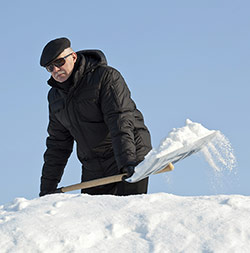Healthy Living
Shoveling Snow? Be Heart Smart
 Although beautiful to look at from the comfort of your living room, winter storms have a dark side that contrasts with the splendor of that frosty whiteness. If shoveling snow is on your to-do-list, be sure to listen to your heart.
Although beautiful to look at from the comfort of your living room, winter storms have a dark side that contrasts with the splendor of that frosty whiteness. If shoveling snow is on your to-do-list, be sure to listen to your heart.If it’s been a while since you’ve done any strenuous physical activity, think twice before venturing out to shovel. Tackling heavy snow can result in more than muscle stiffness or back pain.
But can it cause a heart attack? Possibly, according to a study that showed 7 percent of men started experiencing heart symptoms while shoveling.
If you're not used to physical exertion there is a risk to shoveling snow. The combination of cold temperatures, aerobic activity, and heavy lifting of snow create a demanding physical activity that can unmask any existing or underlying heart disease.
Men who smoke or have a family history of heart disease often report that they first recognized their symptoms while shoveling snow. Demanding, unexpected, and often prolonged exertion—coupled with frigid temperatures—places a heavy burden on the heart, causing it to require more oxygen. If there's any dysfunction of the heart muscle or narrowing of the coronary arteries that supply blood to the heart muscle, oxygen demand can outpace supply, leading to chest pain and even heart attacks.
The best advice is to maintain a constant level of physical activity year-round. Think of it as being in training for the strenuous activity of snow shoveling.
Work with your physician to monitor blood pressure and cholesterol. While these can be influenced by close attention to lifestyle, many people need medications to keep blood pressure and cholesterol under control. These medications are inexpensive and well tolerated.
Listen to Your Heart
So, start easy and listen to what your heart is telling you. During the warmer months, stay active, and keep close tabs on your blood pressure, cholesterol, weight, exercise, and lifestyle.
If you have any of these symptoms, seek quick medical attention:
- Shortness of breath
- Chest, shoulder, neck, or arm pain
- Dizziness, fainting, sweating, or nausea
You could be one of the lucky ones to get off with just a warning.
Courtesy of UR Medicine Cardiac Care experts.

